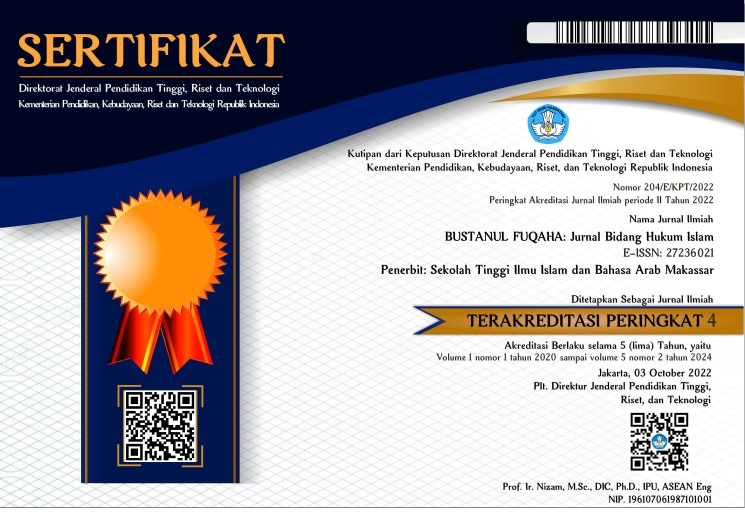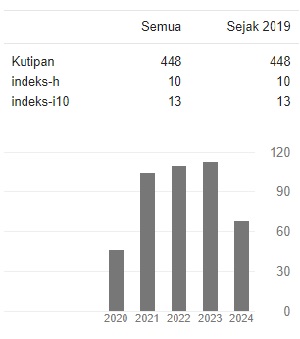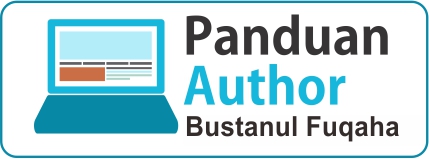Tradisi Akkorontigi dalam Perspektif Hukum Islam (Studi Kasus di Desa Bontosunggu, Kecamatan Bajeng, Kabupaten Gowa)
Akkorontigi Tradition in the Perspective of Islamic Law and Customary Law (Case Study in Bontosunggu Village, Bajeng Sub-District, Gowa Regency)
DOI:
https://doi.org/10.36701/bustanul.v2i1.300Keywords:
Akkorontigi Tradition, Islamic Law, Customary Law, Bontosunggu VillageAbstract
This study aims to determine and understand the akkkorontigi tradition in the Perspective of Islamic Law and Customary Law that occurred in Bontosunggu Village, Bajeng District, Gowa Regency. This type of writing is field research (field research) using historical approaches, social expectations, anthropological approaches and religious approaches, then data collection methods using interview and observation techniques the author tries to argue about the object being studied in accordance with the reality that occurs in society. The results showed that in carrying out marriage, the akkorontigi tradition is one of a series of wedding processions that cannot be missed and is a habit of their ancestors that has existed since time immemorial. The akkorontigi event is a series of sacred events that are attended by all relatives and invited guests which contain values that are meaningful so that the bride's family can live in harmony. However, in practice, it is necessary to present good intentions and distance oneself from thoughts or beliefs that lead to the shirking of the symbols of tools and objects used in Akkorongtigi. Even so, Akkorongtigi can be preserved by applying several solutions in its implementation, such as wearing clothes that are not tight and covering the genitals, and not shaking hands for non-mahrams.
Downloads
References
Al-Bukhārī, Muḥammad ibn Ismā’īl ibn Ibrāhīm, Ṣahīh al-Bukhārī (Cet. I; al-Qāhirah: Dār ibn al-Jauzī, 2010.
Al-Dausarī, Muslim ibn Muḥammad ibn Mājid. Al-Mumti’ fi al-Qawā’id al-Fiqhiyyah, Cet. I; Riyadh: Dār Zidnī, 1428 H/2007.
‘Al-Khallāf, Abd al-Wahhāb. Ilm Uṣūl al-Fiqh, Cet. XIII; Kairo: Dār al-Qalam, 1398 H/1978 M.
Al-Khuḍarī Bik, Muḥammad. Tārikh al-Tasyrī’ al-Islāmī, Cet. VII; Indonesia: Dār Iḥyā’ al-‘Arabiyyah, 1401 H/1971 M.
Al-Majīd, Aḥmad ‘Abd. Muḥaḍarāt fi Uṣūl al-Fiqh, Cet. IV; Pasuran: Garuda Buana Indah,1994.
Al-Ṭabrānī, Sulaimān ibn Aḥmad ibn Ayyūb, al-Mu’jam al-Kabīr, Juz 20 (Cet. II; al-Qāhirah: Maktabah ibn Taimiyyah, t.th.
Gaffar, Abd. Peranan Al-'urf dalam Mengistimbatkan Hukum Islam, Skripsi, Mangkoso, Fakultas Syariah STAI DDI Mongkoso, 2003.
Hanafi, Ahmad. Pengantar dan Sejarah Hukum Islam, Cet.II; Jakarta: Bulan Bintang, 1997.
Kementerian Agama Republik Indonesia, Al-Qur’an dan Terjemahnya. Jakarta: Syaamil quran, 2014.
Mudjib, Abd. Kaidah-Kaidah Fikih, Cet. I; Jakarta: Kalam Mulia, 1994.
Novira, Nuraeni, and Auliani Ahmad. "Tinjauan Akidah Islam terhadap Adat Mappalili di Balla Lompoa Kelurahan Baju Bodoa Kecamatan Maros Baru Kabupaten Maros Sulawesi Selatan." NUKHBATUL'ULUM: Jurnal Bidang Kajian Islam 5.1 (2019): 15-25.
Salim, Agus. Risalah Nikah, Cet.III; Jakarta: Pustaka Amani, 1998.
Saransi, Ahmad. Tradisi Masyarakat Islam di Sulawesi Selatan, Cet. I; Makassar: Lamanca Press, 2003.
Soekamto, Sujono. Sosiologi Suatu Pengantar, Jakarta: Raja Grafindo, 2001.
Syandri, Syandri, Kasman Bakry, and Salman Al Farisi. "Adat Mappasikarawa pada Perkawinan Masyarakat Bugis Perspektif Hukum Islam (Studi Kasus Desa Kaballangan Kabupaten Pinrang)." BUSTANUL FUQAHA: Jurnal Bidang Hukum Islam 1.4 (2020): 611-626.
Wijaya, Hendra, and Fadlan Akbar. "Tradisi Te'nea dalam Perspektif Hukum Islam (Studi Kasus di Desa Majannang)." NUKHBATUL'ULUM: Jurnal Bidang Kajian Islam 6.1 (2020): 145-158.
Yahya Muhtar, Fatehurahman. Dasar-Dasar Pembinaan Hukum Fikih Islam, Cet. I; Bandung: Al-Ma’rif, 2001.
Sumber Wawancara:
Asdar DM, A.Md., 35 Tahun, Sekretaris II Desa Bontosunggu, Wawancara, Bontotangnga Desa Bontosunggu, (5 Desember 2019)
Daeng Kanang (44 tahun), Pemangku adat, Wawancara, Bontotangnga Desa Bontosunggu, 25 November 2019.
Fatmawati (35 tahun), Masyarakat Bontotangnga Desa Bontosunggu, Wawancara, Gowa, 20 September 2019.
Hapipa Daeng Calla, 71 Tahun, Masyarakat Desa Bontosunggu, Wawancara, Bontotangnga Desa Bontosunggu, (7 Desember 2019).
Nurliah, 57 Tahun, Anrong Bunting, Wawancara, Bontotangnga Desa Bontosunggu, (26 November 2019).
Zaenab, 62 Tahun, Objek atau Pelaku Akkorontigi, Wawancara, Bontotangnga Desa Bontosunggu, (9 Desember 2019).
Downloads
Published
Issue
Section
License
Copyright (c) 2021 BUSTANUL FUQAHA: Jurnal Bidang Hukum Islam

This work is licensed under a Creative Commons Attribution-NonCommercial-ShareAlike 4.0 International License.














